Analysis of Critical Issue in Business and Management Report
VerifiedAdded on 2020/04/21
|13
|3671
|115
Report
AI Summary
This report critically analyzes the impact of leadership and employee retention in the age of uncertainty within the context of business and management. It explores the crucial role of workplace culture and employee engagement in fostering customer loyalty. The report delves into the benefits of engaged employees, organizational commitment, and self-efficiency, highlighting how these factors contribute to improved performance and a positive work environment. It also addresses the challenges posed by new technologies and globalization, emphasizing the importance of open communication, supportive leadership, and adaptation to cultural diversity. The report provides insights into strategies for leaders to build loyal, talented, and supportive employees during times of change, including the use of feedback mechanisms and the promotion of employee well-being.
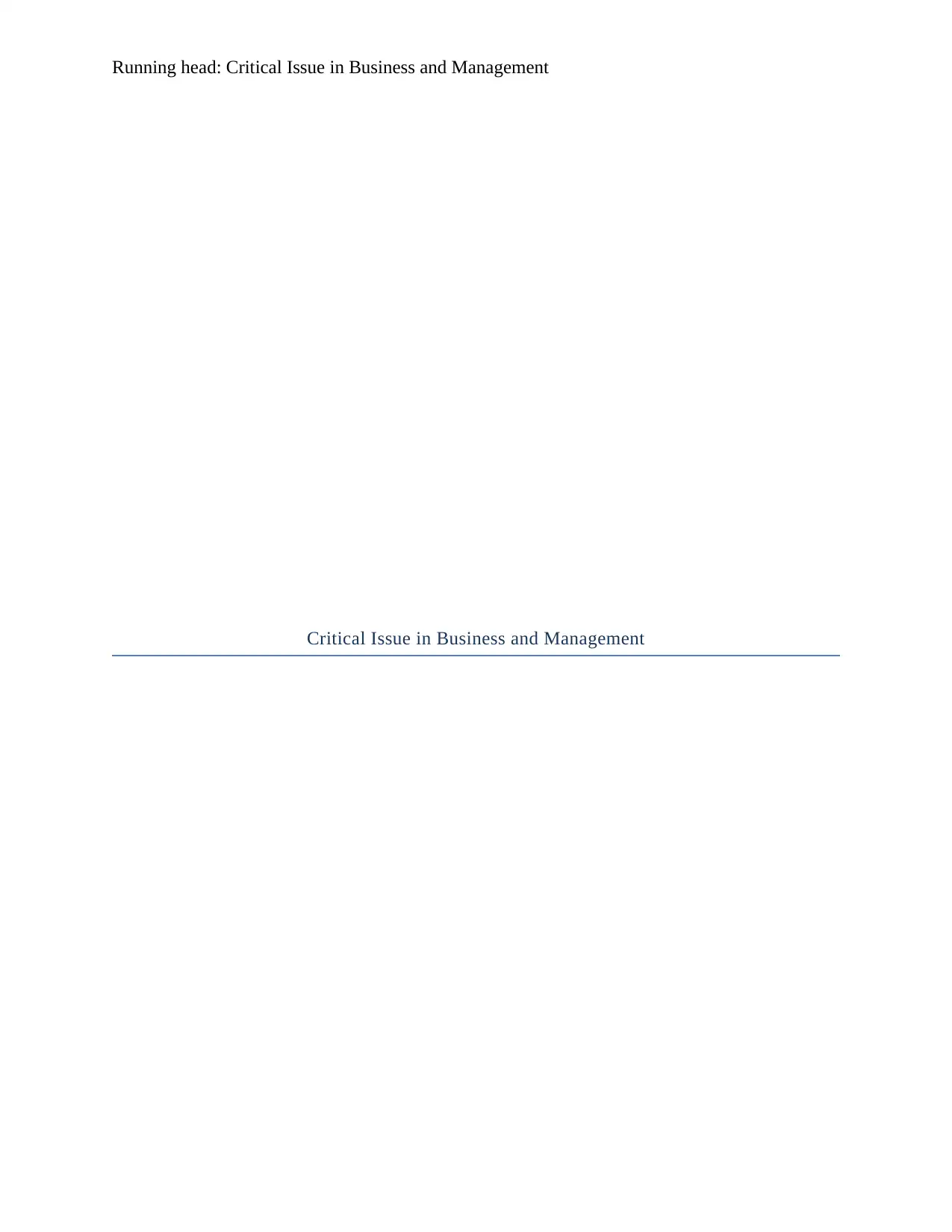
Running head: Critical Issue in Business and Management
Critical Issue in Business and Management
Critical Issue in Business and Management
Paraphrase This Document
Need a fresh take? Get an instant paraphrase of this document with our AI Paraphraser
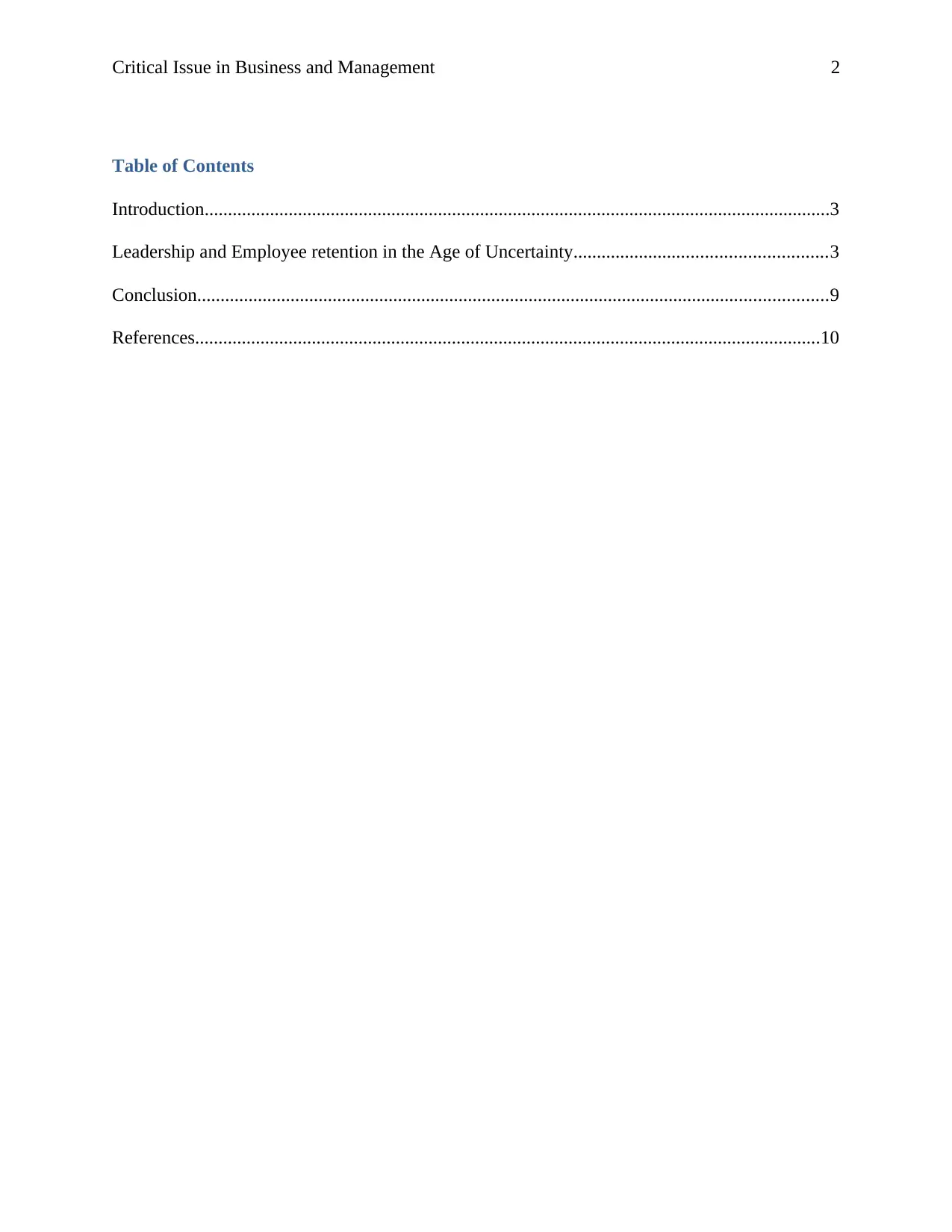
Critical Issue in Business and Management 2
Table of Contents
Introduction......................................................................................................................................3
Leadership and Employee retention in the Age of Uncertainty......................................................3
Conclusion.......................................................................................................................................9
References......................................................................................................................................10
Table of Contents
Introduction......................................................................................................................................3
Leadership and Employee retention in the Age of Uncertainty......................................................3
Conclusion.......................................................................................................................................9
References......................................................................................................................................10
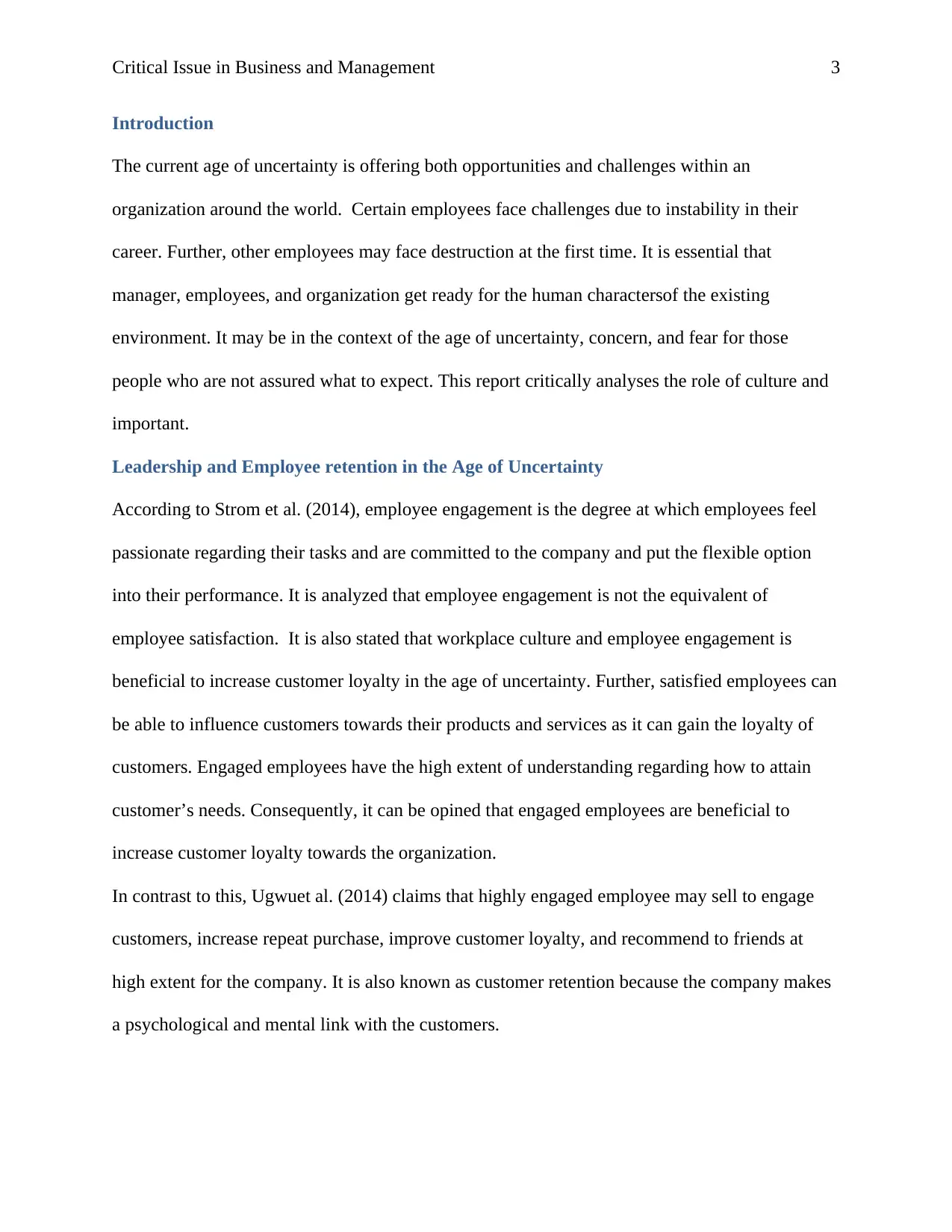
Critical Issue in Business and Management 3
Introduction
The current age of uncertainty is offering both opportunities and challenges within an
organization around the world. Certain employees face challenges due to instability in their
career. Further, other employees may face destruction at the first time. It is essential that
manager, employees, and organization get ready for the human charactersof the existing
environment. It may be in the context of the age of uncertainty, concern, and fear for those
people who are not assured what to expect. This report critically analyses the role of culture and
important.
Leadership and Employee retention in the Age of Uncertainty
According to Strom et al. (2014), employee engagement is the degree at which employees feel
passionate regarding their tasks and are committed to the company and put the flexible option
into their performance. It is analyzed that employee engagement is not the equivalent of
employee satisfaction. It is also stated that workplace culture and employee engagement is
beneficial to increase customer loyalty in the age of uncertainty. Further, satisfied employees can
be able to influence customers towards their products and services as it can gain the loyalty of
customers. Engaged employees have the high extent of understanding regarding how to attain
customer’s needs. Consequently, it can be opined that engaged employees are beneficial to
increase customer loyalty towards the organization.
In contrast to this, Ugwuet al. (2014) claims that highly engaged employee may sell to engage
customers, increase repeat purchase, improve customer loyalty, and recommend to friends at
high extent for the company. It is also known as customer retention because the company makes
a psychological and mental link with the customers.
Introduction
The current age of uncertainty is offering both opportunities and challenges within an
organization around the world. Certain employees face challenges due to instability in their
career. Further, other employees may face destruction at the first time. It is essential that
manager, employees, and organization get ready for the human charactersof the existing
environment. It may be in the context of the age of uncertainty, concern, and fear for those
people who are not assured what to expect. This report critically analyses the role of culture and
important.
Leadership and Employee retention in the Age of Uncertainty
According to Strom et al. (2014), employee engagement is the degree at which employees feel
passionate regarding their tasks and are committed to the company and put the flexible option
into their performance. It is analyzed that employee engagement is not the equivalent of
employee satisfaction. It is also stated that workplace culture and employee engagement is
beneficial to increase customer loyalty in the age of uncertainty. Further, satisfied employees can
be able to influence customers towards their products and services as it can gain the loyalty of
customers. Engaged employees have the high extent of understanding regarding how to attain
customer’s needs. Consequently, it can be opined that engaged employees are beneficial to
increase customer loyalty towards the organization.
In contrast to this, Ugwuet al. (2014) claims that highly engaged employee may sell to engage
customers, increase repeat purchase, improve customer loyalty, and recommend to friends at
high extent for the company. It is also known as customer retention because the company makes
a psychological and mental link with the customers.
⊘ This is a preview!⊘
Do you want full access?
Subscribe today to unlock all pages.

Trusted by 1+ million students worldwide
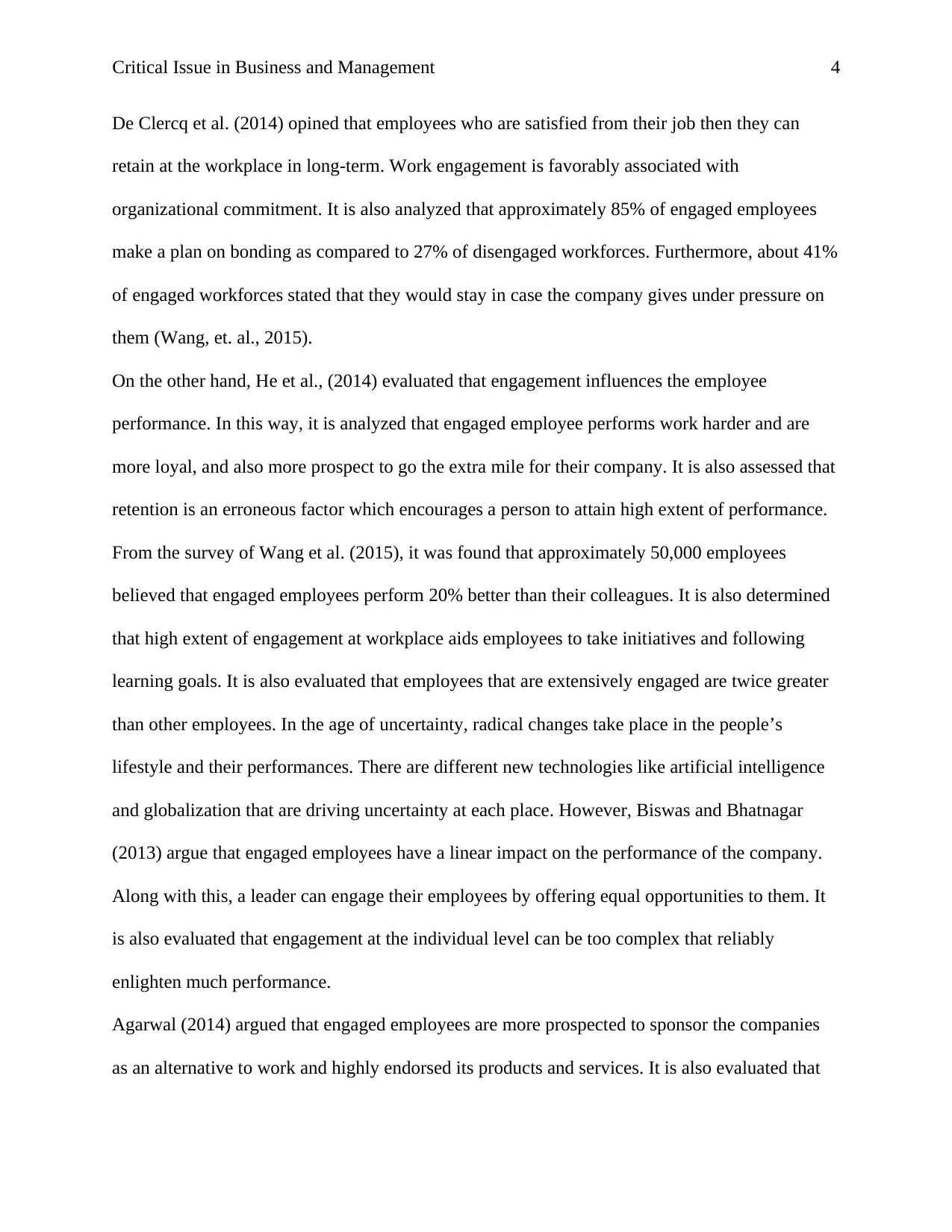
Critical Issue in Business and Management 4
De Clercq et al. (2014) opined that employees who are satisfied from their job then they can
retain at the workplace in long-term. Work engagement is favorably associated with
organizational commitment. It is also analyzed that approximately 85% of engaged employees
make a plan on bonding as compared to 27% of disengaged workforces. Furthermore, about 41%
of engaged workforces stated that they would stay in case the company gives under pressure on
them (Wang, et. al., 2015).
On the other hand, He et al., (2014) evaluated that engagement influences the employee
performance. In this way, it is analyzed that engaged employee performs work harder and are
more loyal, and also more prospect to go the extra mile for their company. It is also assessed that
retention is an erroneous factor which encourages a person to attain high extent of performance.
From the survey of Wang et al. (2015), it was found that approximately 50,000 employees
believed that engaged employees perform 20% better than their colleagues. It is also determined
that high extent of engagement at workplace aids employees to take initiatives and following
learning goals. It is also evaluated that employees that are extensively engaged are twice greater
than other employees. In the age of uncertainty, radical changes take place in the people’s
lifestyle and their performances. There are different new technologies like artificial intelligence
and globalization that are driving uncertainty at each place. However, Biswas and Bhatnagar
(2013) argue that engaged employees have a linear impact on the performance of the company.
Along with this, a leader can engage their employees by offering equal opportunities to them. It
is also evaluated that engagement at the individual level can be too complex that reliably
enlighten much performance.
Agarwal (2014) argued that engaged employees are more prospected to sponsor the companies
as an alternative to work and highly endorsed its products and services. It is also evaluated that
De Clercq et al. (2014) opined that employees who are satisfied from their job then they can
retain at the workplace in long-term. Work engagement is favorably associated with
organizational commitment. It is also analyzed that approximately 85% of engaged employees
make a plan on bonding as compared to 27% of disengaged workforces. Furthermore, about 41%
of engaged workforces stated that they would stay in case the company gives under pressure on
them (Wang, et. al., 2015).
On the other hand, He et al., (2014) evaluated that engagement influences the employee
performance. In this way, it is analyzed that engaged employee performs work harder and are
more loyal, and also more prospect to go the extra mile for their company. It is also assessed that
retention is an erroneous factor which encourages a person to attain high extent of performance.
From the survey of Wang et al. (2015), it was found that approximately 50,000 employees
believed that engaged employees perform 20% better than their colleagues. It is also determined
that high extent of engagement at workplace aids employees to take initiatives and following
learning goals. It is also evaluated that employees that are extensively engaged are twice greater
than other employees. In the age of uncertainty, radical changes take place in the people’s
lifestyle and their performances. There are different new technologies like artificial intelligence
and globalization that are driving uncertainty at each place. However, Biswas and Bhatnagar
(2013) argue that engaged employees have a linear impact on the performance of the company.
Along with this, a leader can engage their employees by offering equal opportunities to them. It
is also evaluated that engagement at the individual level can be too complex that reliably
enlighten much performance.
Agarwal (2014) argued that engaged employees are more prospected to sponsor the companies
as an alternative to work and highly endorsed its products and services. It is also evaluated that
Paraphrase This Document
Need a fresh take? Get an instant paraphrase of this document with our AI Paraphraser
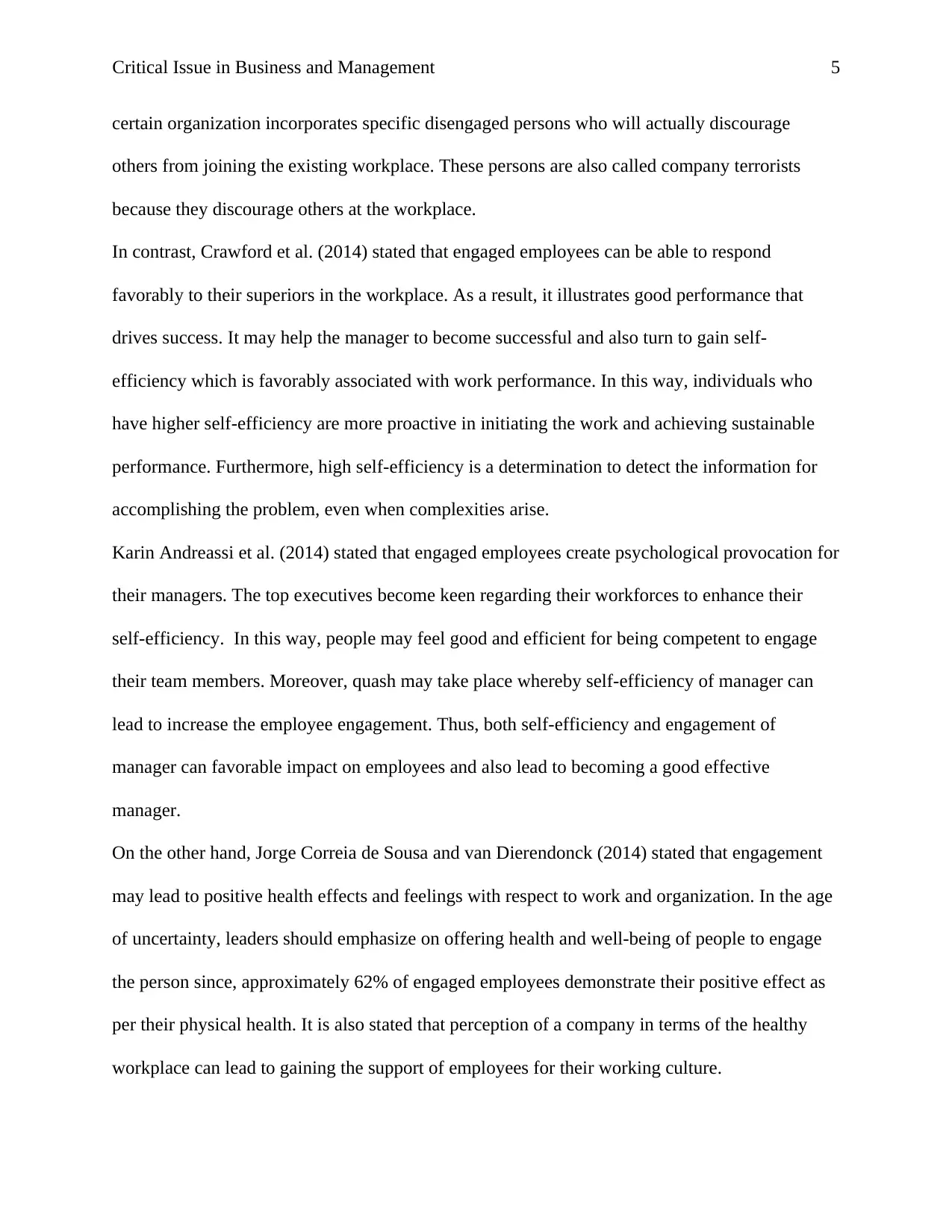
Critical Issue in Business and Management 5
certain organization incorporates specific disengaged persons who will actually discourage
others from joining the existing workplace. These persons are also called company terrorists
because they discourage others at the workplace.
In contrast, Crawford et al. (2014) stated that engaged employees can be able to respond
favorably to their superiors in the workplace. As a result, it illustrates good performance that
drives success. It may help the manager to become successful and also turn to gain self-
efficiency which is favorably associated with work performance. In this way, individuals who
have higher self-efficiency are more proactive in initiating the work and achieving sustainable
performance. Furthermore, high self-efficiency is a determination to detect the information for
accomplishing the problem, even when complexities arise.
Karin Andreassi et al. (2014) stated that engaged employees create psychological provocation for
their managers. The top executives become keen regarding their workforces to enhance their
self-efficiency. In this way, people may feel good and efficient for being competent to engage
their team members. Moreover, quash may take place whereby self-efficiency of manager can
lead to increase the employee engagement. Thus, both self-efficiency and engagement of
manager can favorable impact on employees and also lead to becoming a good effective
manager.
On the other hand, Jorge Correia de Sousa and van Dierendonck (2014) stated that engagement
may lead to positive health effects and feelings with respect to work and organization. In the age
of uncertainty, leaders should emphasize on offering health and well-being of people to engage
the person since, approximately 62% of engaged employees demonstrate their positive effect as
per their physical health. It is also stated that perception of a company in terms of the healthy
workplace can lead to gaining the support of employees for their working culture.
certain organization incorporates specific disengaged persons who will actually discourage
others from joining the existing workplace. These persons are also called company terrorists
because they discourage others at the workplace.
In contrast, Crawford et al. (2014) stated that engaged employees can be able to respond
favorably to their superiors in the workplace. As a result, it illustrates good performance that
drives success. It may help the manager to become successful and also turn to gain self-
efficiency which is favorably associated with work performance. In this way, individuals who
have higher self-efficiency are more proactive in initiating the work and achieving sustainable
performance. Furthermore, high self-efficiency is a determination to detect the information for
accomplishing the problem, even when complexities arise.
Karin Andreassi et al. (2014) stated that engaged employees create psychological provocation for
their managers. The top executives become keen regarding their workforces to enhance their
self-efficiency. In this way, people may feel good and efficient for being competent to engage
their team members. Moreover, quash may take place whereby self-efficiency of manager can
lead to increase the employee engagement. Thus, both self-efficiency and engagement of
manager can favorable impact on employees and also lead to becoming a good effective
manager.
On the other hand, Jorge Correia de Sousa and van Dierendonck (2014) stated that engagement
may lead to positive health effects and feelings with respect to work and organization. In the age
of uncertainty, leaders should emphasize on offering health and well-being of people to engage
the person since, approximately 62% of engaged employees demonstrate their positive effect as
per their physical health. It is also stated that perception of a company in terms of the healthy
workplace can lead to gaining the support of employees for their working culture.
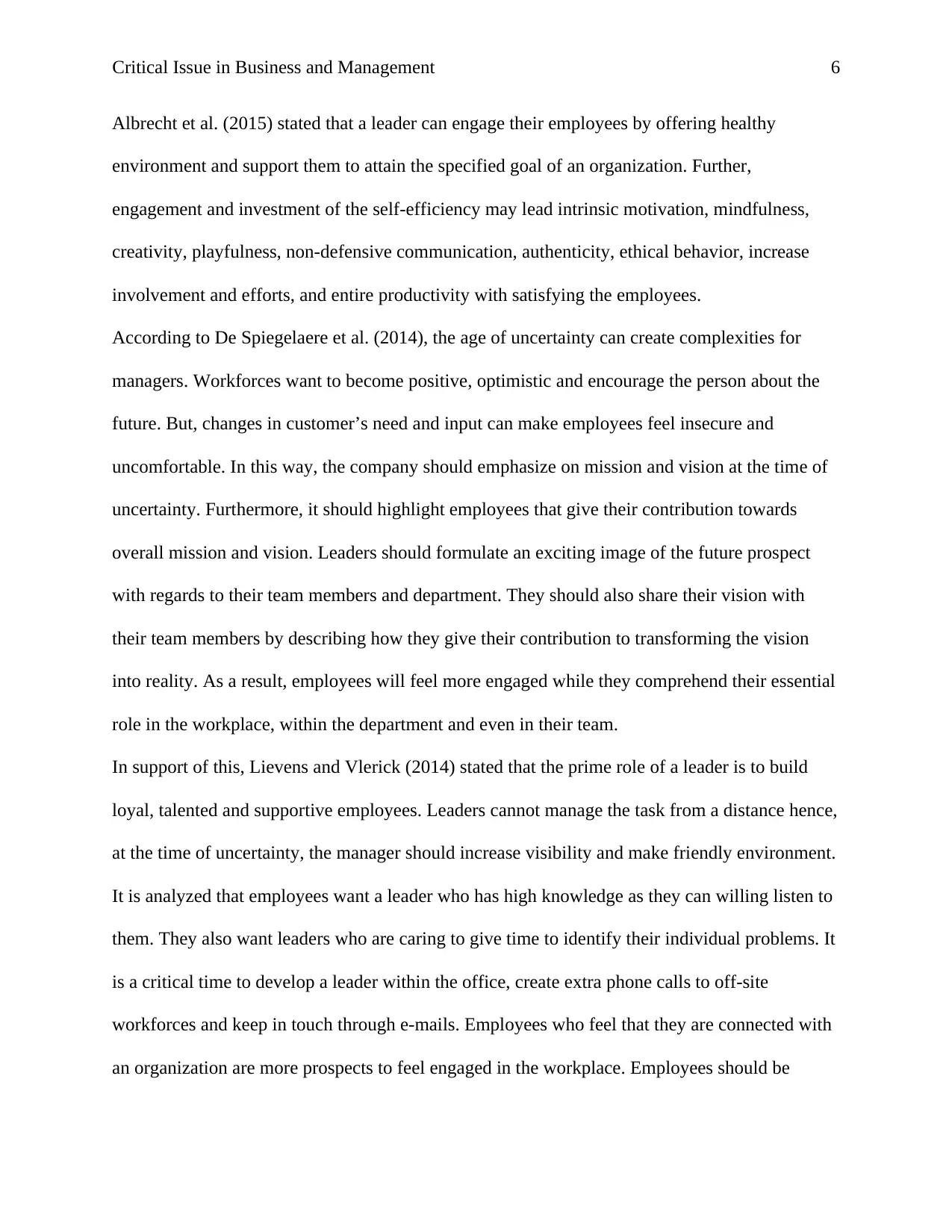
Critical Issue in Business and Management 6
Albrecht et al. (2015) stated that a leader can engage their employees by offering healthy
environment and support them to attain the specified goal of an organization. Further,
engagement and investment of the self-efficiency may lead intrinsic motivation, mindfulness,
creativity, playfulness, non-defensive communication, authenticity, ethical behavior, increase
involvement and efforts, and entire productivity with satisfying the employees.
According to De Spiegelaere et al. (2014), the age of uncertainty can create complexities for
managers. Workforces want to become positive, optimistic and encourage the person about the
future. But, changes in customer’s need and input can make employees feel insecure and
uncomfortable. In this way, the company should emphasize on mission and vision at the time of
uncertainty. Furthermore, it should highlight employees that give their contribution towards
overall mission and vision. Leaders should formulate an exciting image of the future prospect
with regards to their team members and department. They should also share their vision with
their team members by describing how they give their contribution to transforming the vision
into reality. As a result, employees will feel more engaged while they comprehend their essential
role in the workplace, within the department and even in their team.
In support of this, Lievens and Vlerick (2014) stated that the prime role of a leader is to build
loyal, talented and supportive employees. Leaders cannot manage the task from a distance hence,
at the time of uncertainty, the manager should increase visibility and make friendly environment.
It is analyzed that employees want a leader who has high knowledge as they can willing listen to
them. They also want leaders who are caring to give time to identify their individual problems. It
is a critical time to develop a leader within the office, create extra phone calls to off-site
workforces and keep in touch through e-mails. Employees who feel that they are connected with
an organization are more prospects to feel engaged in the workplace. Employees should be
Albrecht et al. (2015) stated that a leader can engage their employees by offering healthy
environment and support them to attain the specified goal of an organization. Further,
engagement and investment of the self-efficiency may lead intrinsic motivation, mindfulness,
creativity, playfulness, non-defensive communication, authenticity, ethical behavior, increase
involvement and efforts, and entire productivity with satisfying the employees.
According to De Spiegelaere et al. (2014), the age of uncertainty can create complexities for
managers. Workforces want to become positive, optimistic and encourage the person about the
future. But, changes in customer’s need and input can make employees feel insecure and
uncomfortable. In this way, the company should emphasize on mission and vision at the time of
uncertainty. Furthermore, it should highlight employees that give their contribution towards
overall mission and vision. Leaders should formulate an exciting image of the future prospect
with regards to their team members and department. They should also share their vision with
their team members by describing how they give their contribution to transforming the vision
into reality. As a result, employees will feel more engaged while they comprehend their essential
role in the workplace, within the department and even in their team.
In support of this, Lievens and Vlerick (2014) stated that the prime role of a leader is to build
loyal, talented and supportive employees. Leaders cannot manage the task from a distance hence,
at the time of uncertainty, the manager should increase visibility and make friendly environment.
It is analyzed that employees want a leader who has high knowledge as they can willing listen to
them. They also want leaders who are caring to give time to identify their individual problems. It
is a critical time to develop a leader within the office, create extra phone calls to off-site
workforces and keep in touch through e-mails. Employees who feel that they are connected with
an organization are more prospects to feel engaged in the workplace. Employees should be
⊘ This is a preview!⊘
Do you want full access?
Subscribe today to unlock all pages.

Trusted by 1+ million students worldwide
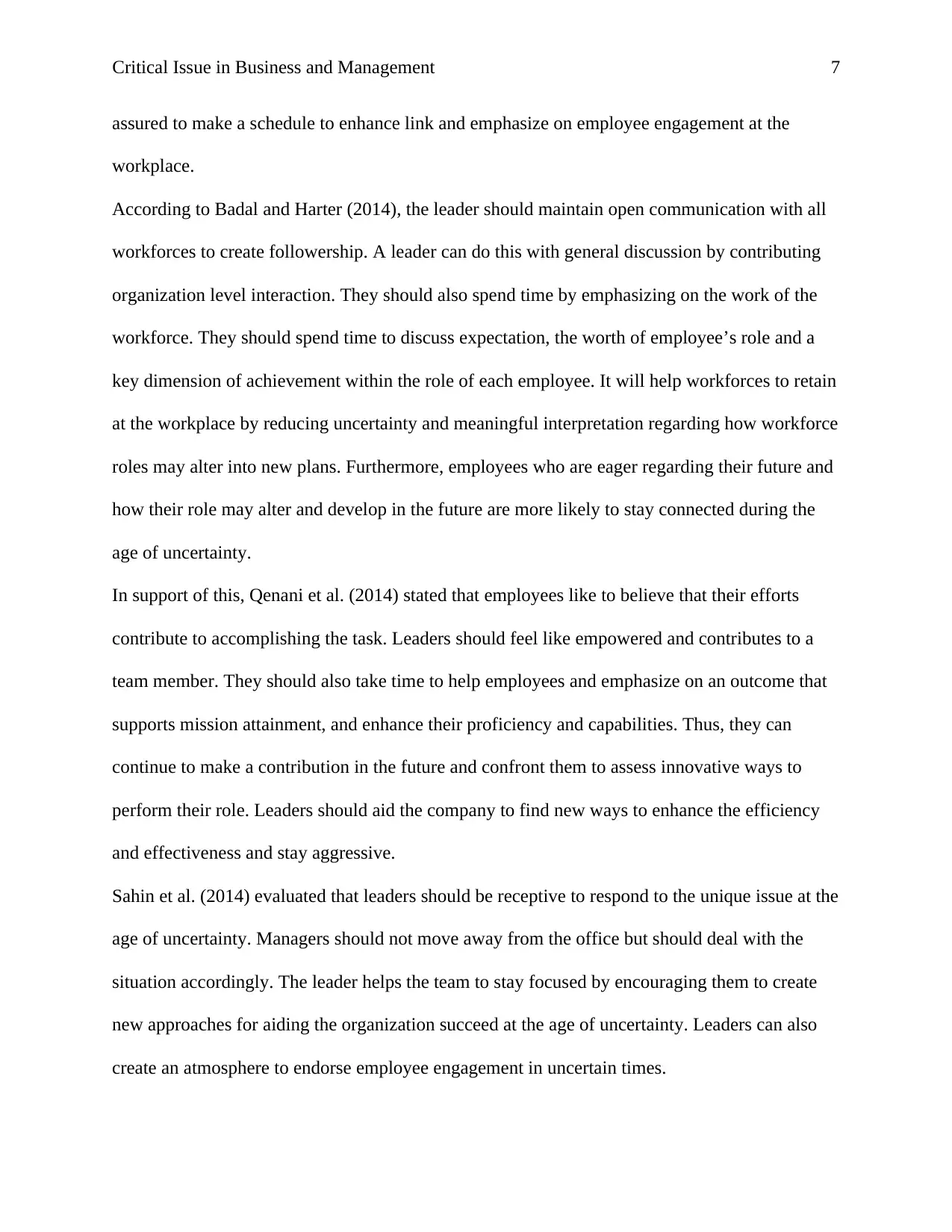
Critical Issue in Business and Management 7
assured to make a schedule to enhance link and emphasize on employee engagement at the
workplace.
According to Badal and Harter (2014), the leader should maintain open communication with all
workforces to create followership. A leader can do this with general discussion by contributing
organization level interaction. They should also spend time by emphasizing on the work of the
workforce. They should spend time to discuss expectation, the worth of employee’s role and a
key dimension of achievement within the role of each employee. It will help workforces to retain
at the workplace by reducing uncertainty and meaningful interpretation regarding how workforce
roles may alter into new plans. Furthermore, employees who are eager regarding their future and
how their role may alter and develop in the future are more likely to stay connected during the
age of uncertainty.
In support of this, Qenani et al. (2014) stated that employees like to believe that their efforts
contribute to accomplishing the task. Leaders should feel like empowered and contributes to a
team member. They should also take time to help employees and emphasize on an outcome that
supports mission attainment, and enhance their proficiency and capabilities. Thus, they can
continue to make a contribution in the future and confront them to assess innovative ways to
perform their role. Leaders should aid the company to find new ways to enhance the efficiency
and effectiveness and stay aggressive.
Sahin et al. (2014) evaluated that leaders should be receptive to respond to the unique issue at the
age of uncertainty. Managers should not move away from the office but should deal with the
situation accordingly. The leader helps the team to stay focused by encouraging them to create
new approaches for aiding the organization succeed at the age of uncertainty. Leaders can also
create an atmosphere to endorse employee engagement in uncertain times.
assured to make a schedule to enhance link and emphasize on employee engagement at the
workplace.
According to Badal and Harter (2014), the leader should maintain open communication with all
workforces to create followership. A leader can do this with general discussion by contributing
organization level interaction. They should also spend time by emphasizing on the work of the
workforce. They should spend time to discuss expectation, the worth of employee’s role and a
key dimension of achievement within the role of each employee. It will help workforces to retain
at the workplace by reducing uncertainty and meaningful interpretation regarding how workforce
roles may alter into new plans. Furthermore, employees who are eager regarding their future and
how their role may alter and develop in the future are more likely to stay connected during the
age of uncertainty.
In support of this, Qenani et al. (2014) stated that employees like to believe that their efforts
contribute to accomplishing the task. Leaders should feel like empowered and contributes to a
team member. They should also take time to help employees and emphasize on an outcome that
supports mission attainment, and enhance their proficiency and capabilities. Thus, they can
continue to make a contribution in the future and confront them to assess innovative ways to
perform their role. Leaders should aid the company to find new ways to enhance the efficiency
and effectiveness and stay aggressive.
Sahin et al. (2014) evaluated that leaders should be receptive to respond to the unique issue at the
age of uncertainty. Managers should not move away from the office but should deal with the
situation accordingly. The leader helps the team to stay focused by encouraging them to create
new approaches for aiding the organization succeed at the age of uncertainty. Leaders can also
create an atmosphere to endorse employee engagement in uncertain times.
Paraphrase This Document
Need a fresh take? Get an instant paraphrase of this document with our AI Paraphraser
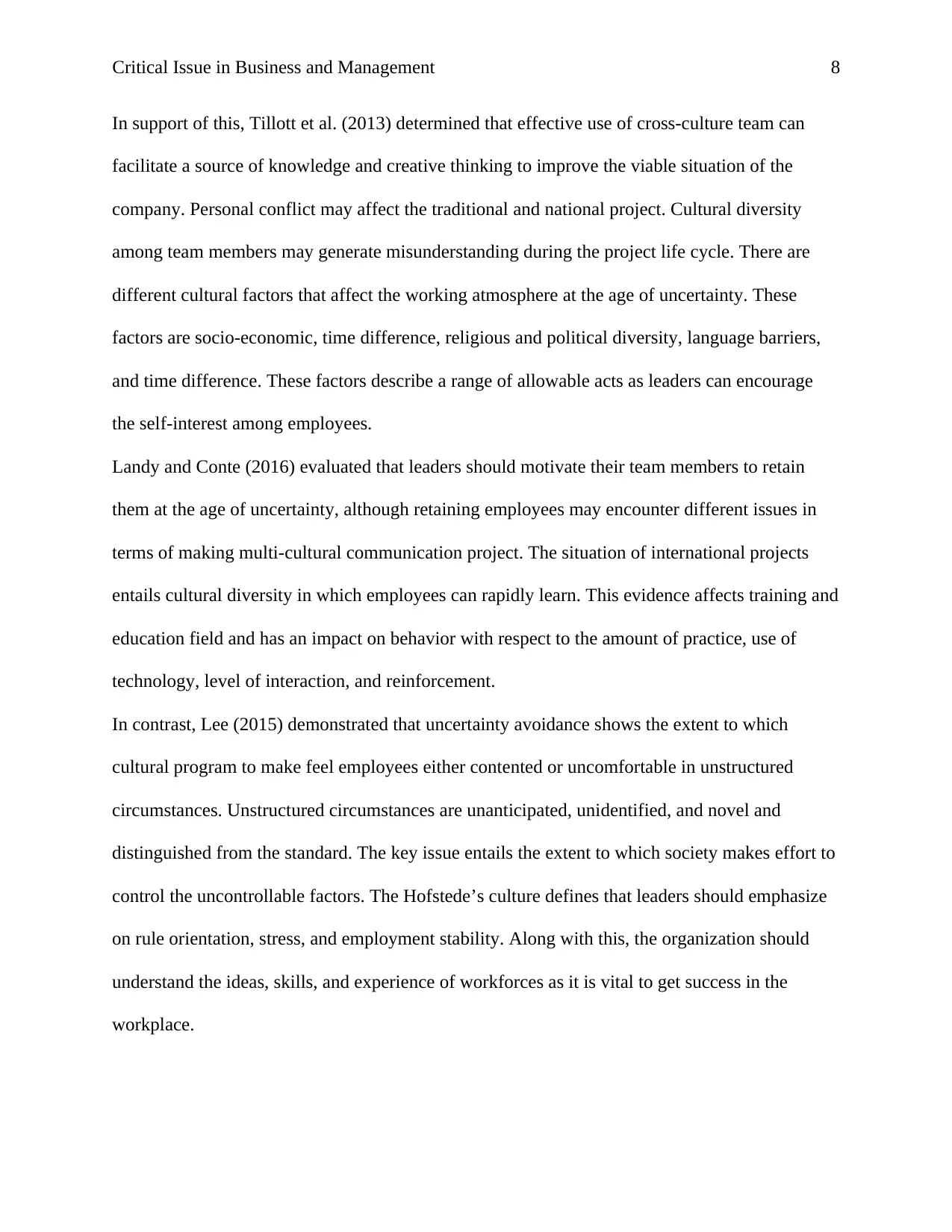
Critical Issue in Business and Management 8
In support of this, Tillott et al. (2013) determined that effective use of cross-culture team can
facilitate a source of knowledge and creative thinking to improve the viable situation of the
company. Personal conflict may affect the traditional and national project. Cultural diversity
among team members may generate misunderstanding during the project life cycle. There are
different cultural factors that affect the working atmosphere at the age of uncertainty. These
factors are socio-economic, time difference, religious and political diversity, language barriers,
and time difference. These factors describe a range of allowable acts as leaders can encourage
the self-interest among employees.
Landy and Conte (2016) evaluated that leaders should motivate their team members to retain
them at the age of uncertainty, although retaining employees may encounter different issues in
terms of making multi-cultural communication project. The situation of international projects
entails cultural diversity in which employees can rapidly learn. This evidence affects training and
education field and has an impact on behavior with respect to the amount of practice, use of
technology, level of interaction, and reinforcement.
In contrast, Lee (2015) demonstrated that uncertainty avoidance shows the extent to which
cultural program to make feel employees either contented or uncomfortable in unstructured
circumstances. Unstructured circumstances are unanticipated, unidentified, and novel and
distinguished from the standard. The key issue entails the extent to which society makes effort to
control the uncontrollable factors. The Hofstede’s culture defines that leaders should emphasize
on rule orientation, stress, and employment stability. Along with this, the organization should
understand the ideas, skills, and experience of workforces as it is vital to get success in the
workplace.
In support of this, Tillott et al. (2013) determined that effective use of cross-culture team can
facilitate a source of knowledge and creative thinking to improve the viable situation of the
company. Personal conflict may affect the traditional and national project. Cultural diversity
among team members may generate misunderstanding during the project life cycle. There are
different cultural factors that affect the working atmosphere at the age of uncertainty. These
factors are socio-economic, time difference, religious and political diversity, language barriers,
and time difference. These factors describe a range of allowable acts as leaders can encourage
the self-interest among employees.
Landy and Conte (2016) evaluated that leaders should motivate their team members to retain
them at the age of uncertainty, although retaining employees may encounter different issues in
terms of making multi-cultural communication project. The situation of international projects
entails cultural diversity in which employees can rapidly learn. This evidence affects training and
education field and has an impact on behavior with respect to the amount of practice, use of
technology, level of interaction, and reinforcement.
In contrast, Lee (2015) demonstrated that uncertainty avoidance shows the extent to which
cultural program to make feel employees either contented or uncomfortable in unstructured
circumstances. Unstructured circumstances are unanticipated, unidentified, and novel and
distinguished from the standard. The key issue entails the extent to which society makes effort to
control the uncontrollable factors. The Hofstede’s culture defines that leaders should emphasize
on rule orientation, stress, and employment stability. Along with this, the organization should
understand the ideas, skills, and experience of workforces as it is vital to get success in the
workplace.
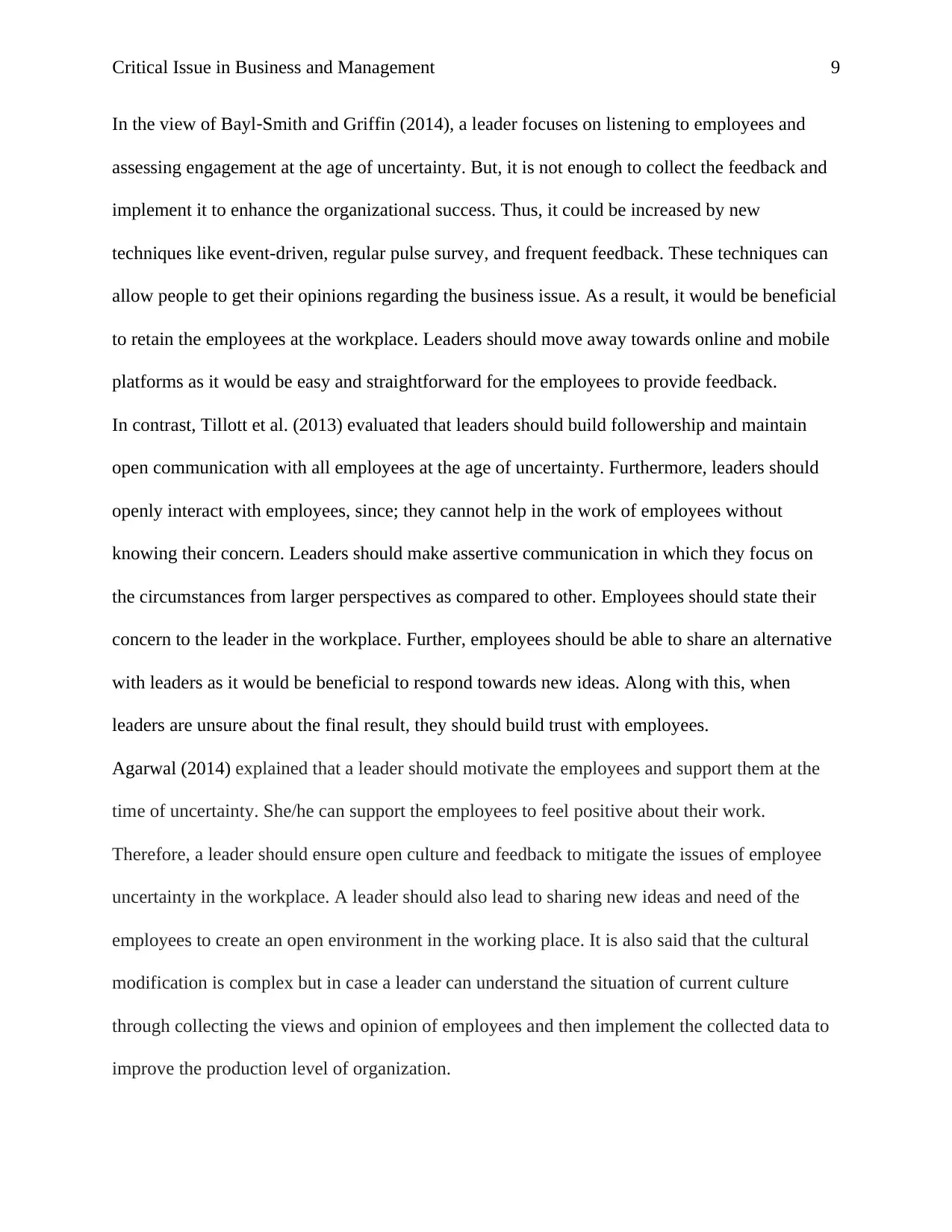
Critical Issue in Business and Management 9
In the view of Bayl‐Smith and Griffin (2014), a leader focuses on listening to employees and
assessing engagement at the age of uncertainty. But, it is not enough to collect the feedback and
implement it to enhance the organizational success. Thus, it could be increased by new
techniques like event-driven, regular pulse survey, and frequent feedback. These techniques can
allow people to get their opinions regarding the business issue. As a result, it would be beneficial
to retain the employees at the workplace. Leaders should move away towards online and mobile
platforms as it would be easy and straightforward for the employees to provide feedback.
In contrast, Tillott et al. (2013) evaluated that leaders should build followership and maintain
open communication with all employees at the age of uncertainty. Furthermore, leaders should
openly interact with employees, since; they cannot help in the work of employees without
knowing their concern. Leaders should make assertive communication in which they focus on
the circumstances from larger perspectives as compared to other. Employees should state their
concern to the leader in the workplace. Further, employees should be able to share an alternative
with leaders as it would be beneficial to respond towards new ideas. Along with this, when
leaders are unsure about the final result, they should build trust with employees.
Agarwal (2014) explained that a leader should motivate the employees and support them at the
time of uncertainty. She/he can support the employees to feel positive about their work.
Therefore, a leader should ensure open culture and feedback to mitigate the issues of employee
uncertainty in the workplace. A leader should also lead to sharing new ideas and need of the
employees to create an open environment in the working place. It is also said that the cultural
modification is complex but in case a leader can understand the situation of current culture
through collecting the views and opinion of employees and then implement the collected data to
improve the production level of organization.
In the view of Bayl‐Smith and Griffin (2014), a leader focuses on listening to employees and
assessing engagement at the age of uncertainty. But, it is not enough to collect the feedback and
implement it to enhance the organizational success. Thus, it could be increased by new
techniques like event-driven, regular pulse survey, and frequent feedback. These techniques can
allow people to get their opinions regarding the business issue. As a result, it would be beneficial
to retain the employees at the workplace. Leaders should move away towards online and mobile
platforms as it would be easy and straightforward for the employees to provide feedback.
In contrast, Tillott et al. (2013) evaluated that leaders should build followership and maintain
open communication with all employees at the age of uncertainty. Furthermore, leaders should
openly interact with employees, since; they cannot help in the work of employees without
knowing their concern. Leaders should make assertive communication in which they focus on
the circumstances from larger perspectives as compared to other. Employees should state their
concern to the leader in the workplace. Further, employees should be able to share an alternative
with leaders as it would be beneficial to respond towards new ideas. Along with this, when
leaders are unsure about the final result, they should build trust with employees.
Agarwal (2014) explained that a leader should motivate the employees and support them at the
time of uncertainty. She/he can support the employees to feel positive about their work.
Therefore, a leader should ensure open culture and feedback to mitigate the issues of employee
uncertainty in the workplace. A leader should also lead to sharing new ideas and need of the
employees to create an open environment in the working place. It is also said that the cultural
modification is complex but in case a leader can understand the situation of current culture
through collecting the views and opinion of employees and then implement the collected data to
improve the production level of organization.
⊘ This is a preview!⊘
Do you want full access?
Subscribe today to unlock all pages.

Trusted by 1+ million students worldwide
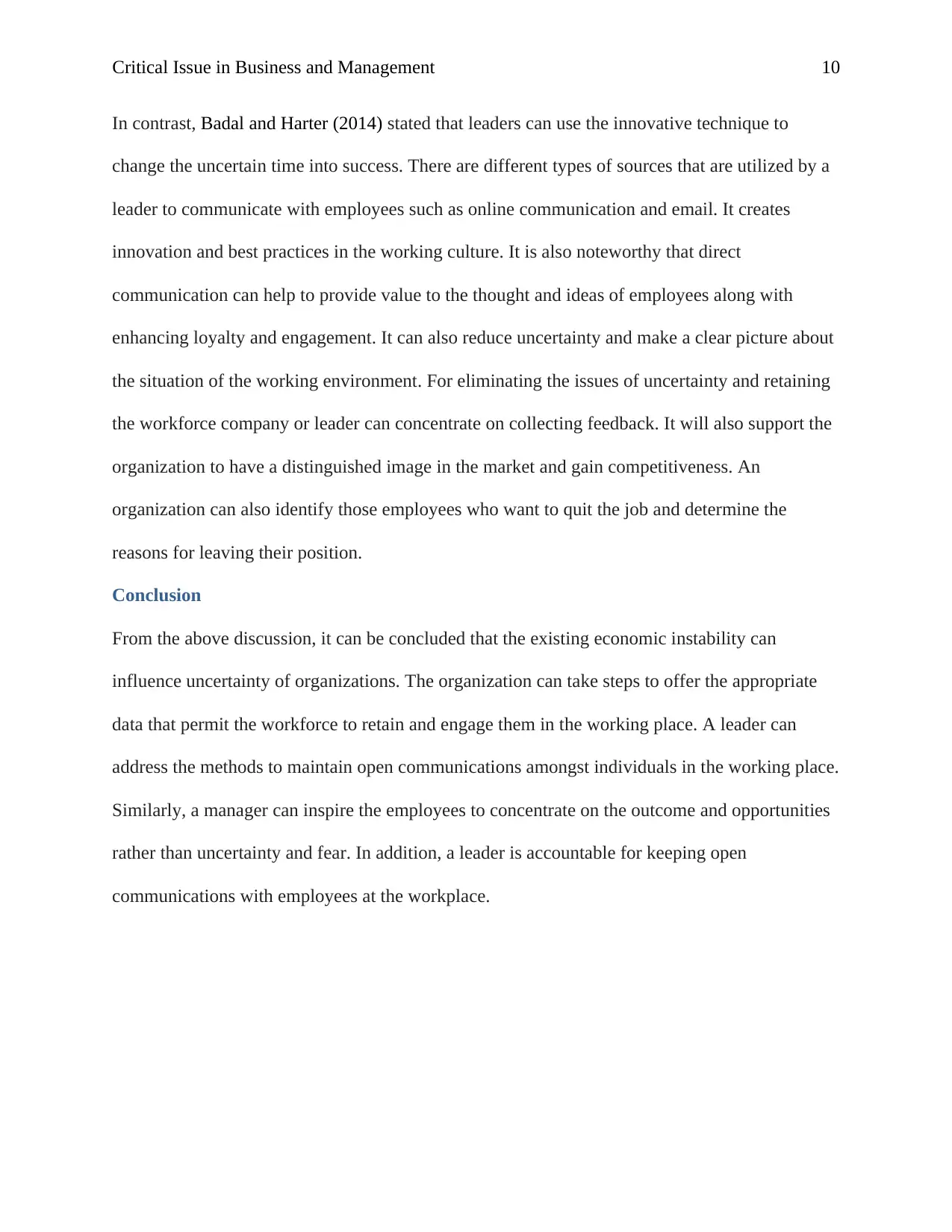
Critical Issue in Business and Management 10
In contrast, Badal and Harter (2014) stated that leaders can use the innovative technique to
change the uncertain time into success. There are different types of sources that are utilized by a
leader to communicate with employees such as online communication and email. It creates
innovation and best practices in the working culture. It is also noteworthy that direct
communication can help to provide value to the thought and ideas of employees along with
enhancing loyalty and engagement. It can also reduce uncertainty and make a clear picture about
the situation of the working environment. For eliminating the issues of uncertainty and retaining
the workforce company or leader can concentrate on collecting feedback. It will also support the
organization to have a distinguished image in the market and gain competitiveness. An
organization can also identify those employees who want to quit the job and determine the
reasons for leaving their position.
Conclusion
From the above discussion, it can be concluded that the existing economic instability can
influence uncertainty of organizations. The organization can take steps to offer the appropriate
data that permit the workforce to retain and engage them in the working place. A leader can
address the methods to maintain open communications amongst individuals in the working place.
Similarly, a manager can inspire the employees to concentrate on the outcome and opportunities
rather than uncertainty and fear. In addition, a leader is accountable for keeping open
communications with employees at the workplace.
In contrast, Badal and Harter (2014) stated that leaders can use the innovative technique to
change the uncertain time into success. There are different types of sources that are utilized by a
leader to communicate with employees such as online communication and email. It creates
innovation and best practices in the working culture. It is also noteworthy that direct
communication can help to provide value to the thought and ideas of employees along with
enhancing loyalty and engagement. It can also reduce uncertainty and make a clear picture about
the situation of the working environment. For eliminating the issues of uncertainty and retaining
the workforce company or leader can concentrate on collecting feedback. It will also support the
organization to have a distinguished image in the market and gain competitiveness. An
organization can also identify those employees who want to quit the job and determine the
reasons for leaving their position.
Conclusion
From the above discussion, it can be concluded that the existing economic instability can
influence uncertainty of organizations. The organization can take steps to offer the appropriate
data that permit the workforce to retain and engage them in the working place. A leader can
address the methods to maintain open communications amongst individuals in the working place.
Similarly, a manager can inspire the employees to concentrate on the outcome and opportunities
rather than uncertainty and fear. In addition, a leader is accountable for keeping open
communications with employees at the workplace.
Paraphrase This Document
Need a fresh take? Get an instant paraphrase of this document with our AI Paraphraser
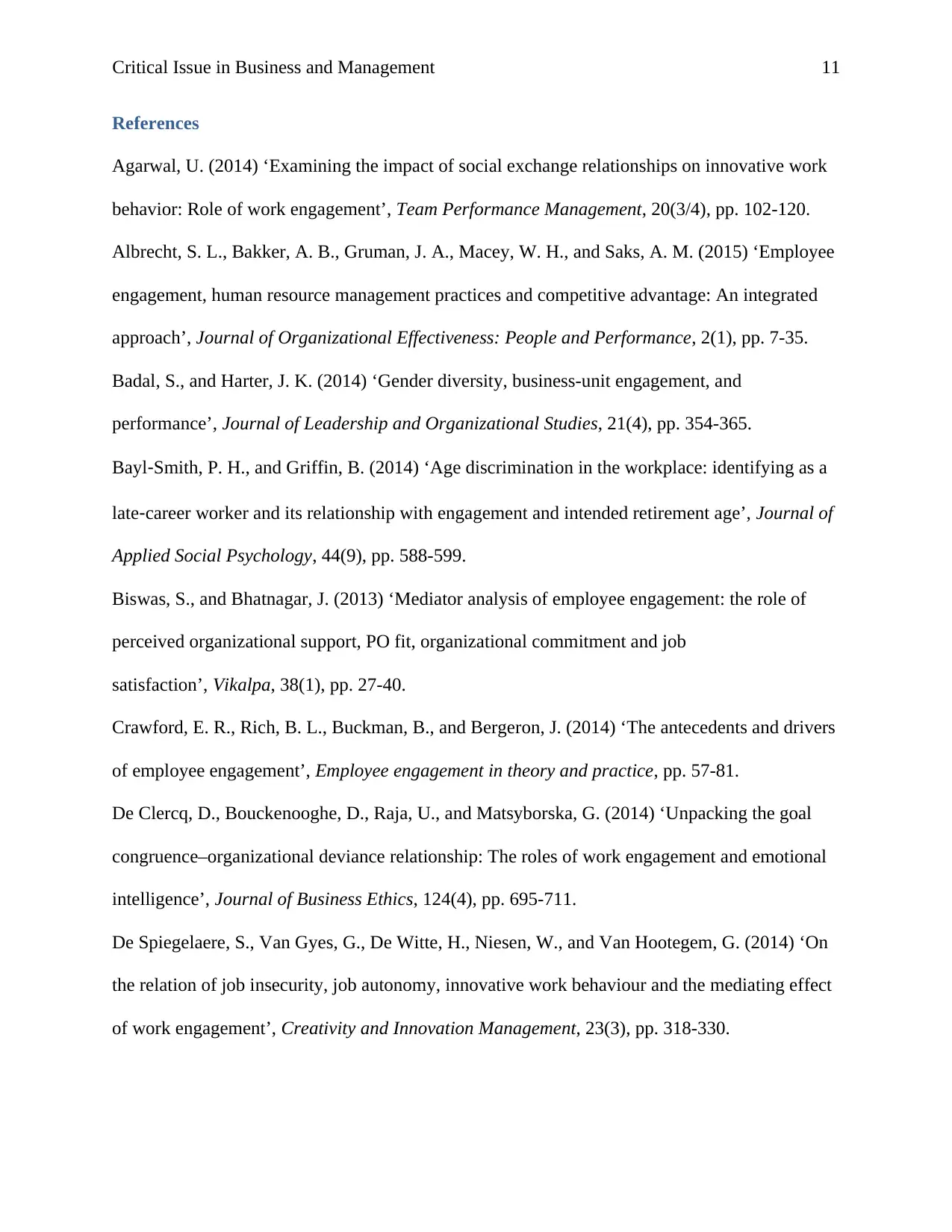
Critical Issue in Business and Management 11
References
Agarwal, U. (2014) ‘Examining the impact of social exchange relationships on innovative work
behavior: Role of work engagement’, Team Performance Management, 20(3/4), pp. 102-120.
Albrecht, S. L., Bakker, A. B., Gruman, J. A., Macey, W. H., and Saks, A. M. (2015) ‘Employee
engagement, human resource management practices and competitive advantage: An integrated
approach’, Journal of Organizational Effectiveness: People and Performance, 2(1), pp. 7-35.
Badal, S., and Harter, J. K. (2014) ‘Gender diversity, business-unit engagement, and
performance’, Journal of Leadership and Organizational Studies, 21(4), pp. 354-365.
Bayl‐Smith, P. H., and Griffin, B. (2014) ‘Age discrimination in the workplace: identifying as a
late‐career worker and its relationship with engagement and intended retirement age’, Journal of
Applied Social Psychology, 44(9), pp. 588-599.
Biswas, S., and Bhatnagar, J. (2013) ‘Mediator analysis of employee engagement: the role of
perceived organizational support, PO fit, organizational commitment and job
satisfaction’, Vikalpa, 38(1), pp. 27-40.
Crawford, E. R., Rich, B. L., Buckman, B., and Bergeron, J. (2014) ‘The antecedents and drivers
of employee engagement’, Employee engagement in theory and practice, pp. 57-81.
De Clercq, D., Bouckenooghe, D., Raja, U., and Matsyborska, G. (2014) ‘Unpacking the goal
congruence–organizational deviance relationship: The roles of work engagement and emotional
intelligence’, Journal of Business Ethics, 124(4), pp. 695-711.
De Spiegelaere, S., Van Gyes, G., De Witte, H., Niesen, W., and Van Hootegem, G. (2014) ‘On
the relation of job insecurity, job autonomy, innovative work behaviour and the mediating effect
of work engagement’, Creativity and Innovation Management, 23(3), pp. 318-330.
References
Agarwal, U. (2014) ‘Examining the impact of social exchange relationships on innovative work
behavior: Role of work engagement’, Team Performance Management, 20(3/4), pp. 102-120.
Albrecht, S. L., Bakker, A. B., Gruman, J. A., Macey, W. H., and Saks, A. M. (2015) ‘Employee
engagement, human resource management practices and competitive advantage: An integrated
approach’, Journal of Organizational Effectiveness: People and Performance, 2(1), pp. 7-35.
Badal, S., and Harter, J. K. (2014) ‘Gender diversity, business-unit engagement, and
performance’, Journal of Leadership and Organizational Studies, 21(4), pp. 354-365.
Bayl‐Smith, P. H., and Griffin, B. (2014) ‘Age discrimination in the workplace: identifying as a
late‐career worker and its relationship with engagement and intended retirement age’, Journal of
Applied Social Psychology, 44(9), pp. 588-599.
Biswas, S., and Bhatnagar, J. (2013) ‘Mediator analysis of employee engagement: the role of
perceived organizational support, PO fit, organizational commitment and job
satisfaction’, Vikalpa, 38(1), pp. 27-40.
Crawford, E. R., Rich, B. L., Buckman, B., and Bergeron, J. (2014) ‘The antecedents and drivers
of employee engagement’, Employee engagement in theory and practice, pp. 57-81.
De Clercq, D., Bouckenooghe, D., Raja, U., and Matsyborska, G. (2014) ‘Unpacking the goal
congruence–organizational deviance relationship: The roles of work engagement and emotional
intelligence’, Journal of Business Ethics, 124(4), pp. 695-711.
De Spiegelaere, S., Van Gyes, G., De Witte, H., Niesen, W., and Van Hootegem, G. (2014) ‘On
the relation of job insecurity, job autonomy, innovative work behaviour and the mediating effect
of work engagement’, Creativity and Innovation Management, 23(3), pp. 318-330.
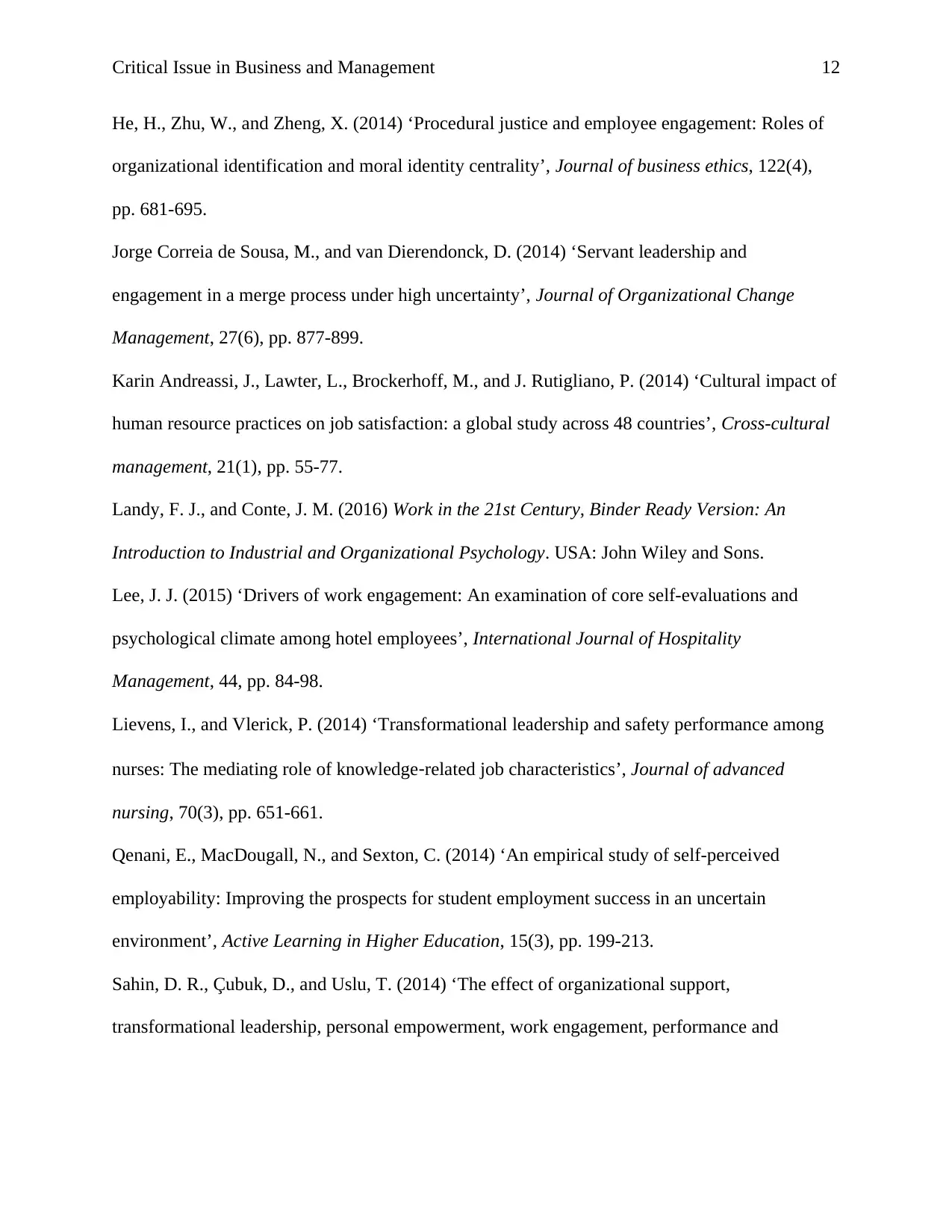
Critical Issue in Business and Management 12
He, H., Zhu, W., and Zheng, X. (2014) ‘Procedural justice and employee engagement: Roles of
organizational identification and moral identity centrality’, Journal of business ethics, 122(4),
pp. 681-695.
Jorge Correia de Sousa, M., and van Dierendonck, D. (2014) ‘Servant leadership and
engagement in a merge process under high uncertainty’, Journal of Organizational Change
Management, 27(6), pp. 877-899.
Karin Andreassi, J., Lawter, L., Brockerhoff, M., and J. Rutigliano, P. (2014) ‘Cultural impact of
human resource practices on job satisfaction: a global study across 48 countries’, Cross-cultural
management, 21(1), pp. 55-77.
Landy, F. J., and Conte, J. M. (2016) Work in the 21st Century, Binder Ready Version: An
Introduction to Industrial and Organizational Psychology. USA: John Wiley and Sons.
Lee, J. J. (2015) ‘Drivers of work engagement: An examination of core self-evaluations and
psychological climate among hotel employees’, International Journal of Hospitality
Management, 44, pp. 84-98.
Lievens, I., and Vlerick, P. (2014) ‘Transformational leadership and safety performance among
nurses: The mediating role of knowledge‐related job characteristics’, Journal of advanced
nursing, 70(3), pp. 651-661.
Qenani, E., MacDougall, N., and Sexton, C. (2014) ‘An empirical study of self-perceived
employability: Improving the prospects for student employment success in an uncertain
environment’, Active Learning in Higher Education, 15(3), pp. 199-213.
Sahin, D. R., Çubuk, D., and Uslu, T. (2014) ‘The effect of organizational support,
transformational leadership, personal empowerment, work engagement, performance and
He, H., Zhu, W., and Zheng, X. (2014) ‘Procedural justice and employee engagement: Roles of
organizational identification and moral identity centrality’, Journal of business ethics, 122(4),
pp. 681-695.
Jorge Correia de Sousa, M., and van Dierendonck, D. (2014) ‘Servant leadership and
engagement in a merge process under high uncertainty’, Journal of Organizational Change
Management, 27(6), pp. 877-899.
Karin Andreassi, J., Lawter, L., Brockerhoff, M., and J. Rutigliano, P. (2014) ‘Cultural impact of
human resource practices on job satisfaction: a global study across 48 countries’, Cross-cultural
management, 21(1), pp. 55-77.
Landy, F. J., and Conte, J. M. (2016) Work in the 21st Century, Binder Ready Version: An
Introduction to Industrial and Organizational Psychology. USA: John Wiley and Sons.
Lee, J. J. (2015) ‘Drivers of work engagement: An examination of core self-evaluations and
psychological climate among hotel employees’, International Journal of Hospitality
Management, 44, pp. 84-98.
Lievens, I., and Vlerick, P. (2014) ‘Transformational leadership and safety performance among
nurses: The mediating role of knowledge‐related job characteristics’, Journal of advanced
nursing, 70(3), pp. 651-661.
Qenani, E., MacDougall, N., and Sexton, C. (2014) ‘An empirical study of self-perceived
employability: Improving the prospects for student employment success in an uncertain
environment’, Active Learning in Higher Education, 15(3), pp. 199-213.
Sahin, D. R., Çubuk, D., and Uslu, T. (2014) ‘The effect of organizational support,
transformational leadership, personal empowerment, work engagement, performance and
⊘ This is a preview!⊘
Do you want full access?
Subscribe today to unlock all pages.

Trusted by 1+ million students worldwide
1 out of 13
Related Documents
Your All-in-One AI-Powered Toolkit for Academic Success.
+13062052269
info@desklib.com
Available 24*7 on WhatsApp / Email
![[object Object]](/_next/static/media/star-bottom.7253800d.svg)
Unlock your academic potential
Copyright © 2020–2026 A2Z Services. All Rights Reserved. Developed and managed by ZUCOL.





